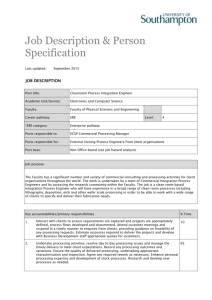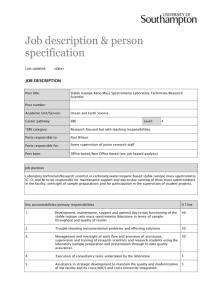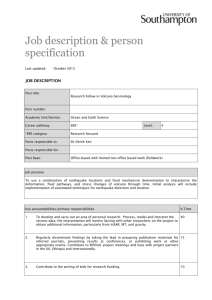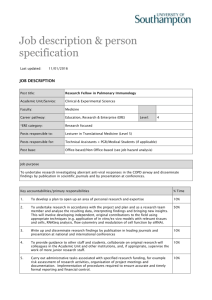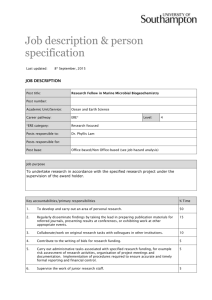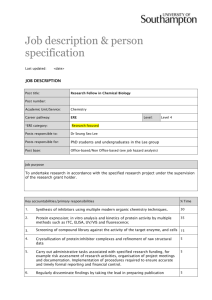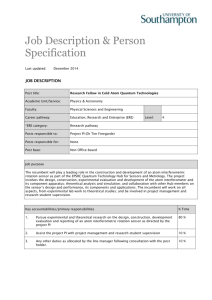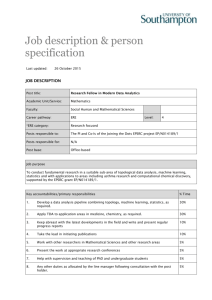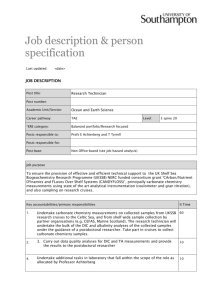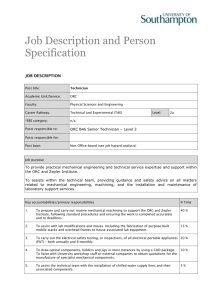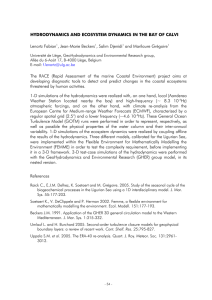Job Description and Person Specification
advertisement
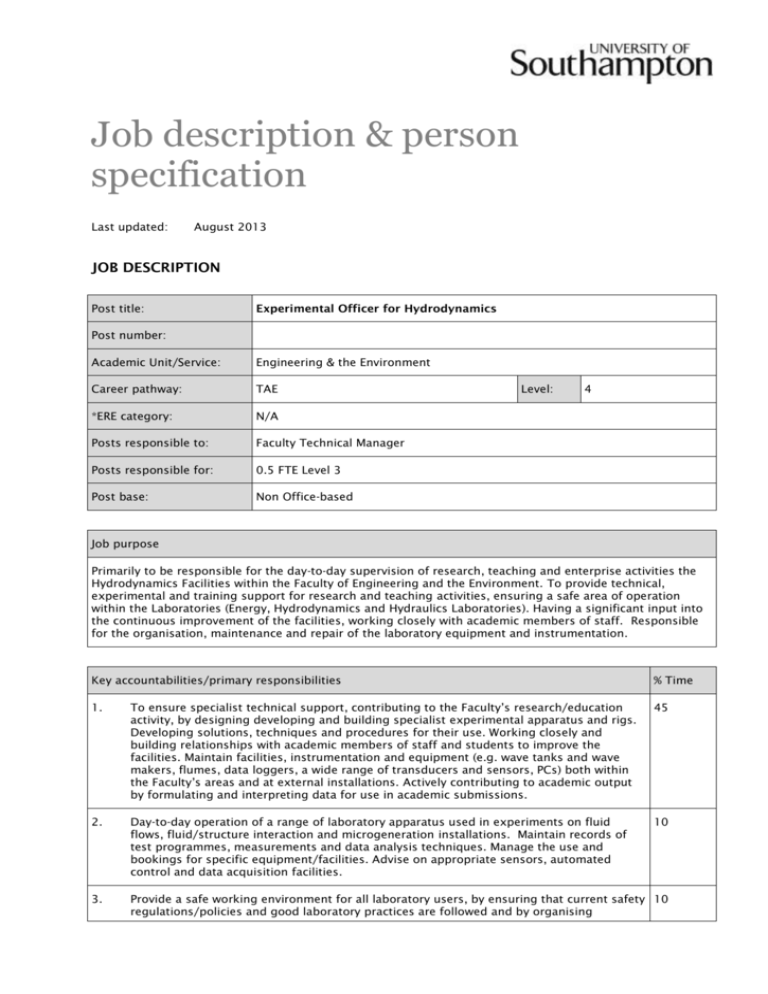
Job description & person specification Last updated: August 2013 JOB DESCRIPTION Post title: Experimental Officer for Hydrodynamics Post number: Academic Unit/Service: Engineering & the Environment Career pathway: TAE *ERE category: N/A Posts responsible to: Faculty Technical Manager Posts responsible for: 0.5 FTE Level 3 Post base: Non Office-based Level: 4 Job purpose Primarily to be responsible for the day-to-day supervision of research, teaching and enterprise activities the Hydrodynamics Facilities within the Faculty of Engineering and the Environment. To provide technical, experimental and training support for research and teaching activities, ensuring a safe area of operation within the Laboratories (Energy, Hydrodynamics and Hydraulics Laboratories). Having a significant input into the continuous improvement of the facilities, working closely with academic members of staff. Responsible for the organisation, maintenance and repair of the laboratory equipment and instrumentation. Key accountabilities/primary responsibilities % Time 1. To ensure specialist technical support, contributing to the Faculty’s research/education activity, by designing developing and building specialist experimental apparatus and rigs. Developing solutions, techniques and procedures for their use. Working closely and building relationships with academic members of staff and students to improve the facilities. Maintain facilities, instrumentation and equipment (e.g. wave tanks and wave makers, flumes, data loggers, a wide range of transducers and sensors, PCs) both within the Faculty’s areas and at external installations. Actively contributing to academic output by formulating and interpreting data for use in academic submissions. 45 2. Day-to-day operation of a range of laboratory apparatus used in experiments on fluid flows, fluid/structure interaction and microgeneration installations. Maintain records of test programmes, measurements and data analysis techniques. Manage the use and bookings for specific equipment/facilities. Advise on appropriate sensors, automated control and data acquisition facilities. 10 3. Provide a safe working environment for all laboratory users, by ensuring that current safety 10 regulations/policies and good laboratory practices are followed and by organising Key accountabilities/primary responsibilities % Time laboratory cleanliness and tidiness. Prepare Risk Assessments for the laboratories and for specific activities. 4. Demonstrate and advise research staff and students on techniques and the use of specialist experimental apparatus, assisting in the interpretation of test results for contribution to academic publications. Provide advice and support relating to the use of any equipment or devices and operate as required. 10 5. Manage the organisation of undergraduate laboratory classes and provide assistance with 15 teaching/demonstrations when required. Instruct, monitor and advise students and staff in the use of laboratory equipment. 6. Source and order laboratory consumable items, equipment and spares, ensuring that stocks of commonly used consumable materials are maintained at adequate levels. Oversee the budget of the work area, maintaining appropriate records. 7. Any other duties as allocated by the line manager following consultation with the post holder. 10 Internal and external relationships (including nature and purpose of relationships) Close liaison with academic and other technical staff within the Faculty’s laboratories, to ensure that joint research and teaching activities are performed with maximum efficiency where shared resources are used. Active involvement in internal and external meetings to provide technical expertise with a solution focused approach, Work with Research Assistants and Fellows with the Faculty’s research groups as appropriate. Liaison with funding bodies for new and on-going research projects. PERSON SPECIFICATION Criteria Essential Desirable Qualifications, knowledge & experience Degree in an engineering or appropriate scientific discipline or equivalent. Knowledge of particular techniques used in hydrodynamics and energy technologies. Knowledge of laboratory measurement and control techniques. Knowledge pertaining to the operation of open channel hydraulics and hydrodynamics applicable to open flumes, tanks and pipeflow. Understanding of electronic control interfaces for experimental systems. Data acquisition techniques and familiarity with data processing techniques. Experience of laboratory and experimental analysis. Competence in the use of information systems, spreadsheets and databases. How to be assessed Application Form with evidence of achievement. Data analysis and technical reporting for scientific publications. Knowledge of “design” softwares such as solid works, CAD Experience of Labview. Design and construction of instruments for laboratory and field measurements. Configuration of hardware and software for laboratory and field Document1 2 measurements. Planning & organising Ability to manage own workload and that of others, to prioritise and meet deadlines and to work under pressure. Problem solving & initiative Identification and correction of faults Ability to use computer packages for Application in laboratory instrumentation and the analysis of qualitative and Form / software. quantitative data. Interview Management & teamwork Ability to analyse interpret and resolve issues. Data processing and extraction of key results. Possess a level of resourcefulness to ensure effective, accurate task completion. Able to exercise initiative and work independently. Management of technical staff. Promotion and development of new techniques. Advise research and undergraduate students. Communicating & influencing Project time management and facility Interview / prioritisation. References Report writing; preparation of Risk Assessments and publicity material and web page construction. Be socially equipped to work as part of a multi-disciplinary team. Interview Management of student lab classes and projects. Oral presentations to engineering or scientific groups. Interview Contribute to the preparation of research proposals. Adopt a flexible approach to both the subject being investigated and the work of the team. Other skills & behaviours Ability to work both independently and as part of a team. Application Form / Interview Willingness to attend further training as appropriate. Special requirements Possess an understanding of the key issues associated with the study of experimental investigations, related to hydrodynamics, and sustainable energy. Prepared to travel both in the UK and Interview abroad. Required to work at, and between, all University sites (including Highfield, Boldrewood and Chilworth Campus’) Required to transport tools and/or equipment between these University sites - Must Hold a full, clean Driving Licence valid in the UK or be able to demonstrate the ability to fulfil this requirement by other appropriate means. Document1 3 JOB HAZARD ANALYSIS OFFICE-BASED POST If this post is an office-based job with routine office hazards (eg: use of VDU) no further information needs to be supplied. NON-OFFICE BASED POST If this post has some hazards other than routine office (eg: more than use of VDU) please complete the analysis below. ## - HR will send a full PEHQ to all applicants for this position. ENVIRONMENTAL EXPOSURES Occasionally Frequently Constantly (<30% of time) (30-60% of time) (> 60% of time) Outside work Y Extremes of temperature (eg: fridge/ furnace) N ## Potential for exposure to body fluids N ## Noise (greater than 80 dba - 8 hrs twa) Y ## Exposure to hazardous substances (eg: solvents, liquids, dust, fumes, biohazards). Specify below: Y Solvents/liquids/chemicals Frequent hand washing N Ionising radiation N EQUIPMENT/TOOLS/MACHINES USED ## Food handling N ## Driving university vehicles(eg: car/van/LGV/PCV) Y ## Use of latex gloves (prohibited unless specific clinical necessity) N ## Vibrating tools (eg: strimmers, hammer drill, lawnmowers) Y PHYSICAL ABILITIES Load manual handling Y Repetitive crouching/kneeling/stooping Y Repetitive pulling/pushing Y Repetitive lifting Y Standing for prolonged periods Y Repetitive climbing (ie: steps, stools, ladders, stairs) N Fine motor grips (eg: pipetting) N Gross motor grips Y Repetitive reaching below shoulder height N Repetitive reaching at shoulder height N Repetitive reaching above shoulder height N PSYCHOSOCIAL ISSUES Face to face contact with public N Lone working Y ## Shift work/night work/on call duties N Document1 4
